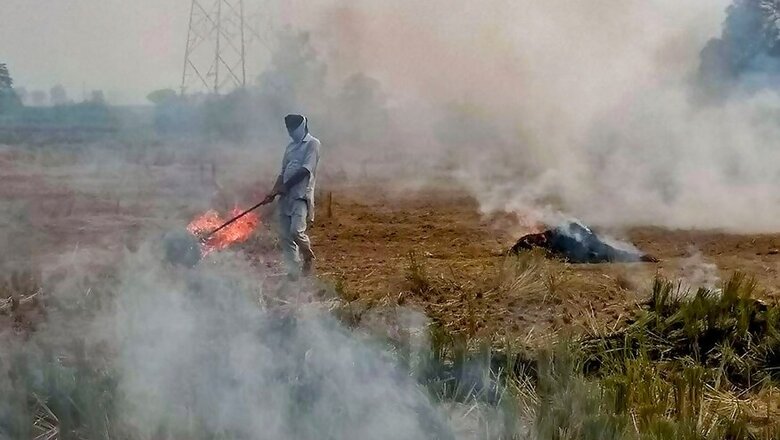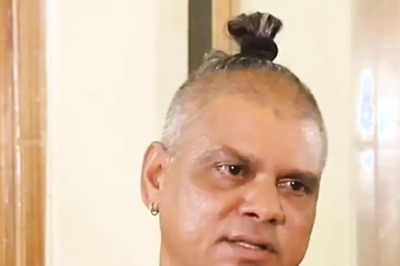Australian Climate Expert Offers Affordable Alternatives to Stubble Burning, Curbing Delhi Pollution

views
New Delhi: The farmers of Punjab, Uttar Pradesh and Haryana have drawn immense flak over the years for burning paddy stubble which produces smoke that makes up much of the deadly smog that envelops Delhi during winter months. This year, however, the problem reached a new height as Delhi’s Air Quality Index (AQI) touched the 'severe' mark a few times, and a public health emergency was declared in the capital in November.
While many steps were taken -- from the Supreme Court issuing directives to states and central government, to mechanisms of reward (compensations) and punishment (FIRs, arrests) being set into motion by various states, to protest marches being organised by the public--- the stubble burning cases have only grown in numbers (in Punjab) over the past few weeks. The problem is far from over in Haryana and UP, indicating that none of these solutions to tackle the issue have effectively managed to motivate the farmers. The farmers argue that they are 'compelled' to burn the stubble because they do not have the infrastructure to dispose-off the crop residue.
An Australian climate expert, scientist and author Tim Flannery, however, has an interesting, 'cheap and effective' solution to the problem. It is something that the Indian farmers could actually like because it demands little, in fact, no effort to manage the crop waste.
In an interview with News18.com, Flannery said, "Initially, the gap was of 10-15 days after which the new crop (wheat) had to be planted. But I understand that now the gap has shrunk to a week because of the climate change. So, when you only have a week (between the harvest of paddy, and sowing of wheat), you cannot effectively use that stubble. But there are technologies already available that allow the farmers to plant the new crop directly into the stubble."
The climate change expert claimed that elimination of the stubble isn't necessary, and letting it stay in the fields can, in fact, be beneficial not just for farmers but also for their produce. "The stubble actually provides benefits because they shade those (wheat) plants ( as long as the stubble is not too thick) and it also keeps the soil moisture in place. It can have a very good outcome, but you need a different kind of drill to do that," he said.
Flannery pointed out that although the drill required to implement this technique isn't very expensive, it should be subsidized by the government so that even the poor and small farmers can use it, and it can effectively stop the whole stubble burning issue. “The drill isn’t expensive, but it is the sort of thing that should be subsidized, rather than fossil fuels. The government need to deploy these new technologies and get farmers to utilize them and then adapt."
However, Flannery added a caveat to his remedy. He said that although this technology has been found to be effective in Australia, it may need slight alterations that make it suitable for Indian climate. "Maybe the Indian conditions need tweaking of this technology, but this can all be done,” he said.
Until now, as various state governments implemented ban on stubble burning, and struggled to provide alternatives to the farmers, technological options have hardly been explored. While Flannery's ideas are creative, one of the main concern is also the financial feasibility of these ideas. The 'tweak' that he talks about is of importance and it need not just mean an adjustment of technology according to our climate but also to the meagre incomes of farmers, and the willingness of various states and central government to subsidize the kind of equipment he is talking about.
The reward system of offering compensation to farmers who did not burn stubble has clearly failed with Punjab government revoking the scheme after they were informed that ineligible people have taken undue advantage of it. On the other hand, despite a large number of farmers' arrests, stubble burning is continuing unabated. In fact, the ban has also angered many farmers, who are now burning stubble as a mark of protest. Flannery, who served as the climate commissioner of Australia for three years said that Indian states, as well as the centre, need climate commissioners who will not only spread awareness about climate change but also learn from such farmers themselves.
During his session at the Tata Literature festival, Flannery emphasized that “.. the wiser people about the local climate are farmers in India. They live and die by the climate, and they know everything.” Therefore, the climate scientist added that one of the important things to do is to understand their perspective while designing new technology.
Apart from stubble burning, a major cause of Delhi's air pollution is traffic. Since the odd-even vehicle rationing has not worked, Flannery suggests that one of the options for the national capital can be to make the use of electrified two-wheelers mandatory.
“There is no reason why the Indian government should not mandate that all two-wheelers should be electrified. China has already gone through that,” he said.




















Comments
0 comment